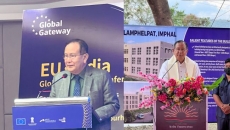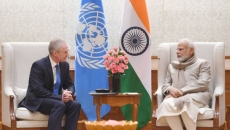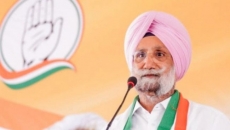India's envoy to Canada says Ottawa has tapped the brakes on trade negotiations, just before Prime Minister Justin Trudeau heads to New Delhi.
Indian High Commissioner Sanjay Kumar Verma said Ottawa sought a pause "within the last month" to ongoing talks for an Early Progress Trade Agreement.
"The Canadian side has requested that, let's take a pause; let's see what can be done further, and then we'll restart," Verma said, in a wide-ranging interview ahead of next week's G20 summit in New Delhi.
"I'm not sure what the reason is. But there is an honest request from the Canadian side, and we have no reason not to accept it."
Since March 2022, the two countries have been negotiating a deal that would be restricted to certain industries, instead of spanning the entire economy.
The talks follow a five-year hiatus. Both countries had entered negotiations in 2010 for a comprehensive deal, but they abandoned the plans in 2017.
Verma said there has been an intense pace of negotiations, which he says reflects the earnestness of both nations wanting closer economic ties.
"Having 10 rounds in 13 months is a huge deal," he said. "Sometimes it progressed so fast that stakeholders were not able to imbibe the outcome."
Verma is a former trade negotiator. He said it's possible Ottawa sought time to better inform industry groups of the proposed deal.
"Our understanding is that there needs to be — now that we are coming closer to the end of the negotiations — probably more consultations with the stakeholders," he said, while stressing "that's my conjecture."
Trade Minister Mary Ng and Global Affairs Canada have been asked to comment.
In May, Ng said it was "not going to be years" by the time both sides sign a deal. Her comments came during a visit by her Indian counterpart, Commerce Minister Piyush Goyal.
At the time, the two issued a statement saying they seek "enhanced co-operation” in the fields of “agricultural goods, chemicals, green technologies, infrastructure, automotive, clean energy, electronics and minerals and metals."
The news of a pause surprised Goldy Hyder, president of the Business Council of Canada, which has advocated for a trade deal for years, and often sends delegations to India.
"As we track this, there has been very much a tumultuous roller-coaster," Hyder said in a Friday interview from Hyderabad, India.
He said India is gradually taking on trade agreements and tends to have protectionist policies, making negotiations tricky.
But he also suspects the talks have been hindered by tensions over a faction of Sikh communities in Canada who advocate for the separation of part of Punjab, which they call Khalistan.
"I don’t think any country would want the sovereignty, of internal affairs of a country, to be interfered with by a third party. There are some elements that I would describe as mischievous to want to disrupt the trade deal," he said.
Hyder argued both governments should avoid letting those elements kill a trade deal that would benefit India and Canada.
Nadir Patel, Canada's former high commissioner to India, said in an interview that trade between the two countries will rise no matter what, but a trade deal would be a boost for both economies.
"If you're a Canadian business leader, India is a place that you want to be," said Patel, in an interview ahead of Verma's comments.
"There's certainly a will on both sides to conclude a deal. But any deal has to be a win-win," said Patel, a senior strategic adviser with Norton Rose Fulbright Canada.
Hyder agreed, and said landing on a deal that works for both countries might mean talks persist past India's general election next spring, and perhaps whenever the Trudeau government's minority ends.
"I would not want our government to sign a bad deal. I think it’s better to have no deal than a bad deal," he said.
Ng is set to visit India in October for a Canadian trade mission.
This report by The Canadian Press was first published Sept. 1, 2023.






